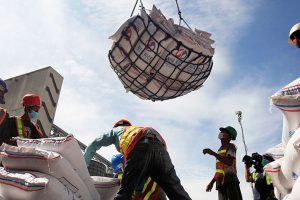Former DA chief says rice law made smuggling easier

THE Rice Tariffication Law must be amended to re-establish the role of the National Food Authority (NFA) as industry regulator, after the liberalization of imports opened the doors to rampant smuggling of the staple grain, former Agriculture Secretary Emmanuel F. Piñol said.
“We don’t need to repeal the law. We only need to amend it. Number one, we need to bring back the regulatory and supervisory powers of the NFA over the rice industry,” Mr. Piñol said on One News.
“While the government was able to collect a lot from tariffs, there is so much technical smuggling. No one is supervising what kind of rice is being brought in,” he added.
Signed in 2019, the law, also known as Republic Act No. 11203, allowed private parties to freely import the grain, on which they paid tariffs of 35% on shipments originating from Southeast Asia. It also reduced the role of the NFA, formerly the primary importer of rice via government-to-government deals, to maintaining emergency rice stocks.
The Federation of Free Farmers (FFF) urged President Ferdinand R. Marcos, Jr. and the new Congress to review the law and propose amendments as necessary.
“Officials of the Department of Finance (DoF) have been insisting that law made rice more affordable by cutting the retail price by P7 per kilo, from its alleged peak of P46 per kilo during the rice crisis in 2018,” the FFF has said.
“These figures were deceptive because they compared current rice prices to their levels in 2018, when prices were abnormally high due to the rice crisis,” it added.
FFF National Manager Raul Q. Montemayor said that although the law allowed the entry of cheaper imported rice, the savings were mostly captured by importers and traders and were not passed on to consumers.
“Also, most of the imports were for premium rice grades for sale to well-off consumers, not the more affordable grades that NFA used to import for the poor. That is why poor consumers today are actually paying almost the same as in 2016 and 2017. To top it off, the P27 per kilo rice that the NFA used to distribute has disappeared from the market,” he added.
ING Bank N.V. Manila Senior Economist Nicholas Antonio T. Mapa said that he hopes the law is retained.
“The law was an important legislation passed by the previous administration and was instrumental in helping lower prices in the Philippines. Part of the law was the Rice Competitiveness Enhancement Fund (RCEF), which funds the improvement of domestic rice production,” he said in an e-mail.
“Given the short-term benefits, like lower rice prices, and medium-term benefits, which is improved rice production domestically, we hope that the law will not be touched,” he added.
Mr. Piñol added that he supported the decision of Mr. Marcos to take over the Department of Agriculture (DA) which would “get things going.”
“I really believe that if Mr. Marcos would like agriculture to develop and flourish during his term, he should hold on to that position until the end of his term,” he said. — Luisa Maria Jacinta C. Jocson




